Guest Post: Coming Out as Feminist
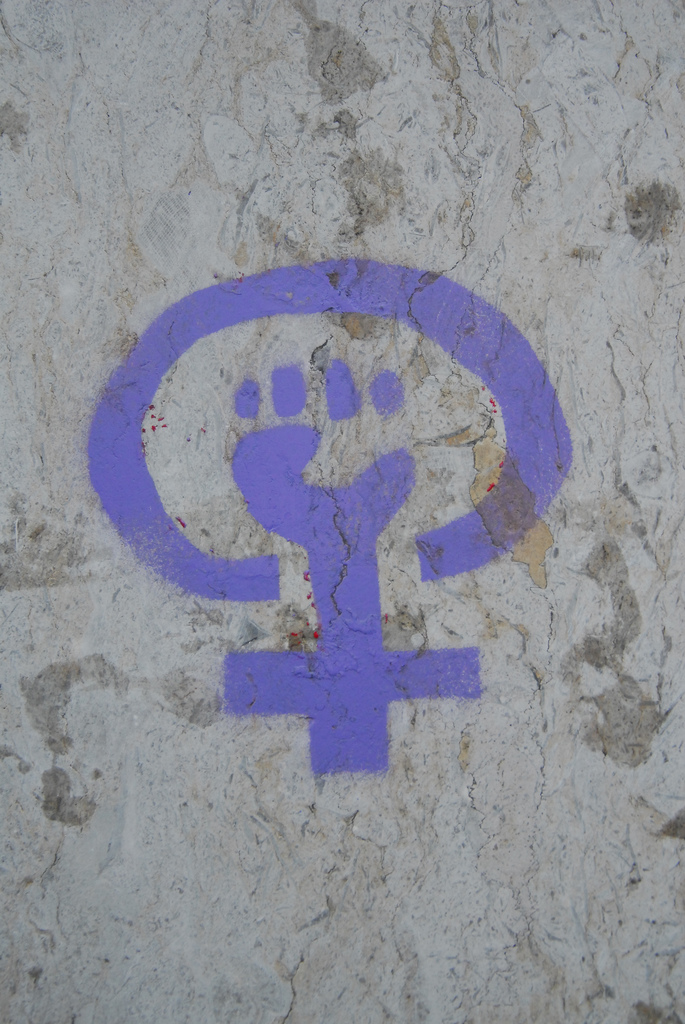
Editor’s Note: Today’s post, by Chris (who also blogs at Grounded Parents), was written a while ago about finally coming to terms with the identity “feminist.”
******
I’m tired.
I’m tired of tiptoeing around labels because “it politicizes the issue.” I’m going to have to put up with “what about the menz” and MRA manifestos of ignorance regardless; I may as well be loud and proud. So today I’m saying fuck it and I’m coming out as feminist.
I’ll just have to cry myself to sleep tonight when my massive throng of MRA fans unfriend and unfollow me.
Feminist is a title I was *GIVEN,* not one I took upon myself. So let me tell you a story about how I became a feminist. Because not that long ago, I sounded exactly like most people who talk about equality and human rights. Cast your mind back just about four years ago. It’s 2010 and the world is still pissed off about the ending of Lost.
I used to be the guy who didn’t like the word feminist. I thought it promoted inequality. By its very nomenclature, it was unequal. I thought it was “all about women.” I preferred words like “humanist” or “equalist.” [2010 Me would have lovedJoss Whedon’s speech late last year.] I listened to feminists fight, sometimes even amongst themselves, to control the meaning of that word. Some versions wanted to include everyone who liked equality. Some radical versions of it declared that as a man, I could NEVER be feminist.
I was above such petty strife, for I was a superior and evolved being who wanted true equality. I didn’t like labels. I preferred to talk about ideas.
Wasn’t I totes evolved? Man that shit was like next-level deep. [2014 Me: The shit certainly was deep.]
Whenever someone asked me about gay rights or women’s rights, I said (with evolved-ier-than-thou benevolence) “Why don’t we work on human rights, brah. Why does it always have to be about one group instead of everyone.” I mean holy-fucking-shit was I ever next-level about this stuff! If I learned one more meaningful truth, I would have evolved into a being of pure energy.
But something about my worldview wasn’t quite right. The allies I was gaining weren’t actually the people who I felt were fighting the good fight.
Whenever I was just humming on about equality in a very non-specific way (“women are people!” “women are equal!” “equality is the default position!” “of course inequality sucks–that should be a given!” “we shouldn’t be treating either gender as special!”) everyone nodded sagely. “Oh Chris, you are sooo right with your rightly rightness!” they would say to me. “You are deep in all the deepest of ways. You call out our sexism and reverse-sexism alike with your platitudes of power!”
“You teach us how to be …” they said with a sniff and a dramatic pause, “.. .better humans.”
Sure, some uppity feminists would be all in my face saying “Um….equality and feminism are the same thing.” I would soften my eyes and say with my best Ted Mosby impression: “Are they? Are they really? Because it seems to me that you can’t exclude an entire gender when you’re talking about equality.”
And, this is the way the world went.
For a time.
But I started to notice something.
People sure did like my equivocal, lukewarm lip service to equality. They really liked it. When I talked about social justice in the vaguest, most noncommittal terms possible, all the white, cis, able males just ate it up.
However, whenever I started to bring up actual specifics, like pay-discrepancies or gender portrayals or sexual assault or human-trafficking or even the way traditional gender roles tend to disadvantage BOTH men and women in different ways, people would begin to use this….other word to describe me.
“Feminist.”
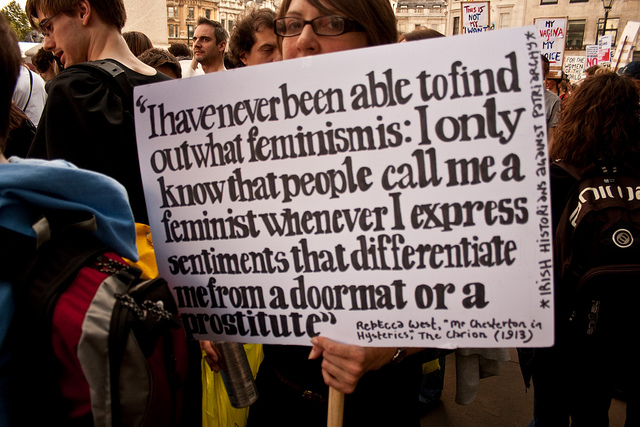
I would deny it, of course. “No no no…this is about equality.” But strangely, they remained unconvinced.
It kept happening. Over and over.
It was an invective–or intended to be. The way “liberal” was used after 9/11 or the way someone says “intelligentsia” to an academic institute that has debunked their pseudo-science. People would often follow up “feminist” with “crap” or “shit” or maybe “agenda.” They would claim that I only cared about these issues because I wanted to get laid and had succumbed to some Manchurian Candidate caliber mind-control, which according to them had also left me impotent (but apparently still wanting to get laid, I guess). This attempt at an incivility became very closely linked with the slightest attention to certain issues–often the issues of greatest inequality, and always the issues surrounding gender.
But I really was about equality. I really did care about all inequality. How could I ignore those issues of the greatest inequality?
Oddly, this never happened when I brought up the inequalities of men. No one labeled me a “masculist” or called me out for ignoring the plight of women. As long as I was talking about men’s issues, I was talking about human issues and general equality. Men’s issues were human issues. Women’s issues were well, you know, some chick thing.
I scratched my head a lot. This wasn’t the struggle for equality I had envisioned with my evolved state. I seemed to have a very specific type of people agreeing with me, and they didn’t seem to care much about actual equality.
If I talked about the selective service or men’s gender roles as providers, people went back to nodding sagely. I didn’t particularly think that these issues quite matched the scope of women’s inequalities, but as long as I talked about the former, and never talked about the latter, people assumed I was all about equality. “True story, brah!” they would say. “We can’t just focus on one side.
Their sage nodding made them look like bobble heads.
Of course, if I began to drift into the territory of blaming those inequalities on our expectations of masculinity and our unequal gender roles, and then–shockingly–it started up again with a vengeance.
“Feminist!”
It was okay to complain about how unfair it was to be a man, but if I suggested any alternative of egalitarian roles or a shifting of power, I was once again a “feminist.”
I began to realize that the discourse itself was laden with inequalities (which of course others had known all along). People–most often (but not always) men–who tend to be into words like “humanism” and “equalism” and insist that today’s default is equality and that “we’re past all that now” were always pitted against me. They seem to believe that only after a laundry list of men’s grievances were rectified, would it even fair to BRING UP women’s issues–to say nothing of spending social capital becoming aware of them.
“That happens to men too!” is the battle cry. “Men have disadvantages too!”
Does it happen to men and so they feel solidarity? No. Does it happen to men and so they can relate? No. Does it happen to men and so they want to link arms and go fix it, together? No. Does it happen to men too and since it’s bad enough they can really appreciate the urgency of the fact that it affects women disproportionately? No. Does it happen to men and they then really GET it? No. Does it happen to men and they turn to women and say “Holy crap my fellow human. Given how difficult this experience is to my half of the population, I can only sympathize with how much worse it is to be disproportionately affected by it! Clearly, you have a legitimate grievance.” No.
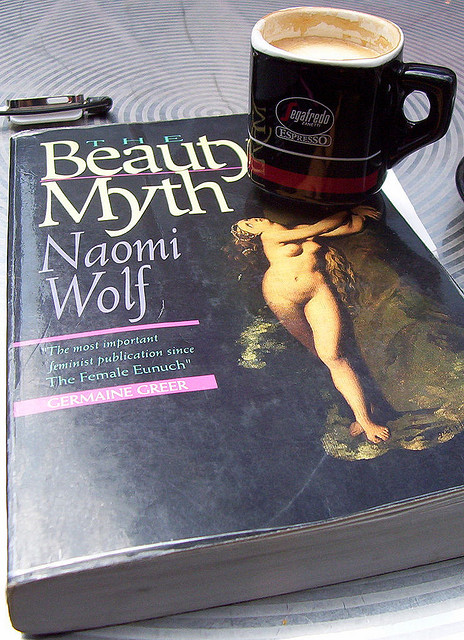
No. It is always, always, ALWAYS used in only one way: “That happens to men too, so shut up.”
Calls for general, vague, unspecified equality are most often used when shutting down conversations about CERTAINissues. Again and again and again. They sound noble, but they are used as the stop energy to a conversation or complaint that women have about their systematic treatment in this world. They are used to silence and derail. They are a counterpoint. And they are employed to achieve anything but equality.
And not to put too fine a point on it, but feminism is willing to discuss how the power systems in play hurt men as well as women. They do it all the time. That’s why they want to dismantle the whole damned system, and in fact, you would only have to listen to a feminist define themselves (rather than their opponents) to grasp this.
“Equalists” without the slightest sense of irony do not seem to be willing to extend women’s issues the same fucking courtesy. They do not seem to realize that their quest to get men’s rights represented happens to the exclusion of women, but also to the exclusion of trans folks, gay folks, people of color, or any other group that isn’t them. Basically, they’re projecting.
I didn’t have to care about gender issues that affected women to the EXCLUSION of men’s issues. I didn’t even have to care about these issues MORE than men’s issues.
I just had to care about them.
At all.
Even a little.
That made me a … “feminist.”
Over and over and over. “Feminist.”
Not an isolated incident. Not a few bad apples. Silencing any genuine, specific inequalities that had anything to do with women was the inevitable, immutable flowchart of cultural sentiment. It was everywhere I went–in person, online, conservative, liberal. Everyone knew the script by heart. Everyone rolled it out when the issues came up. Pernicious, ubiquitous, and always couched in the vestments of equality, it’s only real goal was to shut down one side of the conversation.
“Feminist.”
That’s when I began to realize that the conversation itself was a microcosm of the problem. The slightest loss of focus, attention, and ultimately power from men was unacceptable. God help these poor dudebros that the histrionic feminazis were coming for their ability to control the narrative.
But if they can’t even relinquish their control over the definition of a single word, how are they going to accept entire other narratives?
Fuck man, a guy can’t even ignore the history of feminism and invent words to describe struggles they haven’t been a part of without a bunch of uppity b’s blogging them into oblivion anymore. What IS the world coming to?
And that is why it bothers them. It has begun to dawn on those in power that in order to achieve anything beyond the after school special lip service to the equality they claim to love so dearly, they will have to actually relinquish some of their vaunted power to control how we frame stories, how we use terms, and how we view the struggle for equality. They may have to let half the population have equal say on what the issues of our time are or about the marginalization that still goes on…or holy shitsnacks, even about whether or not a woman they fucked ever actually consented.
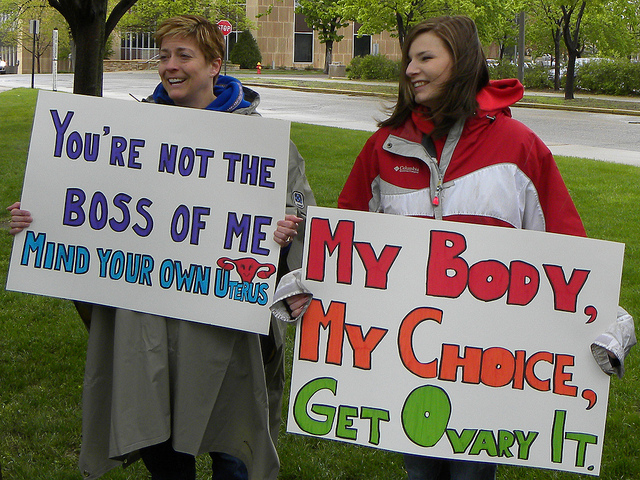
And that scares the crap right out of them.
That’s about when I began to wear the aspersion as a badge of honor.
“Feminist!”
Upsetting people who are struggling (very, very hard, I might add) to maintain the status quo has always been a particular point of amusement for me, so I found “feminist” to be less and less insulting the more it was bandied about.
Because what’s more likely? That a multinational, millions-strong conspiracy of women are trying to assert their superiority over men by talking about how street harassment isn’t actually flattering and telling their rape stories or that maybe–just maybe–the people who stand to have the most to lose from equality are doing what the oppressors have done since the dawn of time in the arc of human history: painting themselves as eminently reasonable and those who struggle under their dominion as hysterical and out of control.
I remember the exact moment when I shifted sides. I was enraged that a judge said a woman wasn’t raped because her pants were too tight. I could barely even type, I was so pissed off. There is no world in which that should be a men’s issue or a women’s issue. That is just a fucked up issue of human suffering and oppression in a kangaroo court.
But when I wrote about how upset it made me? “Feminist!”
“Rape happens to men too,” my sagely-nodding allies said–as if somehow this issue was about them, that someone had claimed otherwise, or that it wasn’t absolutely fucked up enough to be worthy of not derailing for even a few minutes.
That’s why I stopped correcting people. That’s why I started to smirk and give a little half shrug.
The problem isn’t the word feminism. (“Fem” is not a bad thing, and the hypocrisy of this position can be observed when many of the same people with an axe to grind against the word feminism will roll their eyes at changing mankind to humankind.) The problem is the ideas of feminism. If feminists ignored the history and context of their struggles to this point and changed their name tomorrow to “equalists,” these people wouldn’t suddenly jump on board. They would just quibble over that. (Well “equalist” implies that we’re all in the same place, and we all have different abilities and talents, so I prefer the term “egalitarianist” which discusses potential.) As they would quibble over the next term and the next and the next. (“Egalitarianist” implies that we shouldn’t have designated roles ….”) As long as the problem is equality, the word won’t ever matter.
And it’s not as if these people couldn’t struggle for equality under another label–any other label. Instead they have limited their “struggle” to policing the word wherever they see it. When your only cause for equality is to piss and moan about the label used by the people actually doing the work, you suck at caring about equality.
“Feminist.” (Yeah, okay. If that’s what you want to call me. Sure.)
I didn’t claim it. I didn’t declare it. I didn’t even want it at first.
It was hurled at me for caring about things like consent, harassment, or impossible beauty standards. It was flung at me for suggesting that victim blaming sucks or that there might be a double standard in politics. It was lobbed at me like a grenade because I cared about the glass ceiling or vastly, hugely, outrageously imbalanced violence between the genders.
“Feminist!”
So after a while, I picked up the label, dusted it off, and pinned it to my lapel with a shrug. It kind of looked good on me.
No, that’s not even true. I realized that it pisses off exactly the sort of misogynists I like pissing off. It rocks the boat of exactly the mealy-mouthed, diplomatic, Ted Fucking Mosby, Me-From-2010, equalist, what-about-the-menz, status quo lovers I wanted to shake up. It seemed to stand for all the things I actually, really, honestly stood for rather than just their unctuous homage. It meant I was standing with the people I respected for their struggles instead of the people drowning in lip service and apathy. It went beyond platitudes and bumper stickers, and I liked it because of that.
It was what the world saw of me and what the world wouldn’t let me forget, and so now I wear it like armor.
I am a feminist.
******
Author’s bio: Chris lives with his girlfriend and her husband in a polyamorous family. On Friday Dec 6th, 2013, the married couple had a darling boy. Not “dad” but so much more than “Uncle Chris,” he spends much of his time either trying to figure out the boundaries between parent/not-parent or navigating a world ill equipped to deal with non traditional families. When he’s not trying to be a grounded parent, he teaches English as a second language and maintains his own blog about writing (chrisbrecheen.blogspot.com).




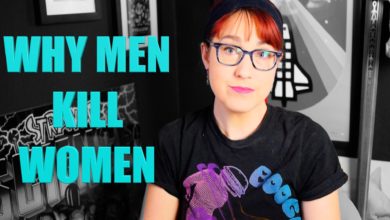
I don’t self-identify as a feminist because, as a male, I think it’s inherently dangerous to do so (to the cause, that is.) The more males claim this term, the greater the risk is of them co-opting it into their own warped definition. In a sense, what you women don’t want is a “Don’t worry, ladies, we’ll take it from here. We know what’s best for you and how to run feminism the correct way.” type situation.
I do, however, agree with all the core tenements of feminism and am more than happy to publicly defend them when and wherever necessary. So I do consider myself a feminist in everything but name and it’s only out of the concern I stated above that I don’t claim the term for myself.
Do you find that other people call you feminist?
Sometimes, and even if they don’t I know they’re thinking it. So my refusal to label myself as such is probably meaningless in the long (and short!) run. And maybe my fear of what I stated is misguided and not a realistic scenario, I can’t say for sure. I just don’t want some men to get interested in the topic without knowing too much about it initially (because it can be tricky due to all the misconceptions of what feminism is, and isn’t, that has been so engrained into our thoughts processes) to misrepresent it and unintentionally use their “male-ness” as authoritative leverage. (For example, someone might listen to an uninformed male feminist and think unfairly “This person is a guy AND a feminist so he really must know what it’s all about…)
I think most people expect women to be feminists so when they see a guy profess to be one, they for some reason seem to believe that his voice matters more on account that he went “out of his way” to become one. That, of course, is part of the many problems we’re trying to solve here.
None of that applies to you, as I can see that you have a firm grip on the topic, but mostly to people I’ve met in my life. All that aside (sorry for the rambling), this was a good article and I enjoyed reading it. So thanks!
I think we’re at a place where feminism needs all the support it can get, and calling ourselves feminists if we agree with the tenets is important. We need to shift that Overton window back, and just as being out has dramatically shifted public perception, the best way to shift public perception of feminists is to self-identify.
This doesn’t mean talking over female feminists, but I think it’s appropriate to step up for feminism and call ourselves feminists when it comes up. We can be a part of the club, and not have to lead it.
I agree, I’ll call myself a feminist proudly, but it’s not my job to develop positions, but rather to relay the arguements and experiences women I know , or of whose work I know. Correct me if I’m wrong but as near as I can tell this is the best way to support the cause without the danger of mascinulizing it.
I think the solution is simple. Let other people decide for themselves. Make your stance on certain topics clear, and people will call you a feminist. Some will do that respectfully, and others scornfully.
That way you also avoid people misunderstanding you because they have a fixed idea of what a feminist stands for, what strategies a feminist wants to employ to reach their goals, whether these are equal outcomes, equal opportunities (or, like mine is, equal autonomy).
And, I think you already know how to make clear that you’re talking for yourself and not for a diverse group of people.
I call myself a fellow-traveller . Since my views are probably best described as “radical feminist,” I figure it has the right radical-revolutionary tone. FWIW, my former boss (a staunch and argumentative Republican) frequently called me a Marxist, so I must be doing something right.
Funny how not wanting unarmed people with their hands up to be shot, or treating women as if they were (gasp!) human beings just like [male] us makes you a radical revolutionary enemy of decency.
My wife and I recently got a pair of ‘this is what a feminist looks like’ T-shirts. I was a little nervous about wearing mine, but the only comment I got was from another man saying he liked what it said.
I really enjoyed reading that. Thank you!
You’re welcome! Thanks for letting me know. It’s nice to hear the good stuff. :)
I definitely say I’m a feminist. Except perhaps in generally feminist comment spaces and blogs where a certain nuance is expected, then I might say pro-feminist or feminist ally. I’m fine with allowing women to define in what way I can contribute to their particular discussion of feminism or what terminology suits their blog.
Either way the people who get pissed of by the word most are exactly those described above. And if someone calls me a feminist pejoratively, I’m fine to both: 1) admit I still have sexist prejudices and 2) ask them if they’re ok being called misogynists or sexists, if they’re against equality.
I really dislike identifying with a “movement” because as soon as you are identified with a “movement” people tend to start making assumptions about you.
I’m certainly a feminist, just like I’m an atheist, but I prefer not to label myself with those terms because there are stereotypes for both those movements that don’t describe me.
Put 10 “feminists” in a room and you will have 10 people with unique views on gender. That’s OK, most, if not all of those views are worthy of discussion.
However, if we label all 10 with the preconceptions of a “feminist” suddenly the discussion is over. That’s not serving anyone.
If you truly believe in equal rights and advantages for the genders then you are a feminist, whether you identify yourself as one or not. If you don’t believe in equal rights and advantages for the genders, then you aren’t a feminist, whether you identify yourself as one or not. It’s not the label that’s important, it’s the goal.
I think the reason I started identifying with the movement and the label is because people made those assumptions anyway.
One of the problems is the difficulty describing it. Like, I know that given my experiences, MRAs will quickly try to coopt me, naturally erasing any racial aspect of it. So I view MRAs with nothing but contempt.
That said, there does need to be a space for male survivors of sexual abuse, maybe as a parallel movement (Sadly, the most obvious name has been preemptively appropriated by douchebros.). And the last thing anyone needs to do is to say ‘quit complaining’. (And this includes how I-VAWA, not to be confused with VAWA, lists male victims of sexual abuse once, as potential abusers. Cue me flashing back to when I was a child, hearing victims become abusers, and trying to find some way to commit suicide before that happened.)
On the other hand, if a man is worried about being falsely accused of rape and doesn’t even care about the low rate of rape convictions and seems to think rape is the only crime anyone has ever been falsely accused of and that middle-to-upper-class college-educated cis heterosexual white males are somehow the group most likely to be falsely accused of any crime, yeah, he lives in his own universe.
You know, I’ve never ACTUALLY met a feminist who didn’t care about how gender equality hurts men too. I am assured such types are out there (usually by feminism’s detractors oddly enough) but even after ten years in the Bay Area of being very aware of feminism and feminist issues, I’ve never really found one.
I did a quick Google for “Male Survivors of Sexual Abuse” and found a number of organizations and resources. There are probably some good organizations in there. :)
Well, I’ve never met one IRL, but on Tumblr or Jezebel, it’s all the rage. You see rape denial (“Quit bragging about having sex when you were 8, Chris Brown.”), gender policing (Yes, I’ve watched MLP on occasion. No, I’ve never thought about the characters in a sexual manner, and the fact that someone would makes me vomit just a little.), and they might say something about an issue for African women, then get called on for their shit by a real African feminist with a price on her head for her activism, and they get more militant.
Yeah, the internets world is weird. On Tumblr, we created Social Justice Sally to make fun of this idiocy. Note that the idea was actual leftists making fun of people who can repeat memes but know nothing about the issue in question. But then the usual scum appropriated the meme.
IRL, Mary P Koss denies that men are raped, unless we’re penetrated. This excludes me. This has an effect on how the government collects rape statistics, the current compromise being a ‘forced to penetrate’ category.
Then again, to turn a phrase, two feminists, three opinions. I know a woman who identifies as a feminist and still uses ‘whore’ pejoratively, of all things.